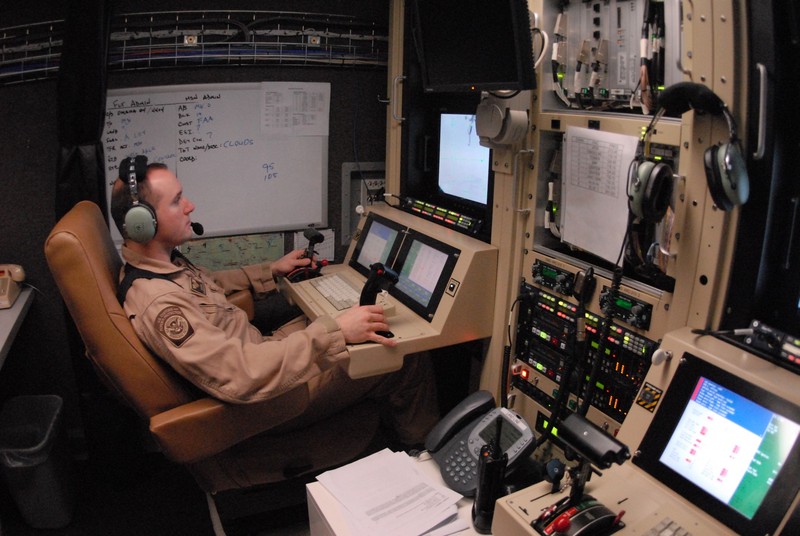The U.S. Air Force faces a personnel crisis when it comes to the drone pilots.
In a report published for the Brookings Institution think tank, Air Force Colonel Bradley Hoagland said UAV recruitment offices does not get a sufficient number of volunteers.
Back in 2008 only 3% of flying crew were related to drones. Last year the number reached 8,5%. Still more are needed because the sorties is on the rise.
The UAV fleet of the USAF constitutes of 152 Predators, 96 Reapers and 23 Global Hawks HALE airframes.
But there is little request for drones assignments and the amount the rate of drone pilots resigning or retiring is 3 times higher than that recorded among pilots flying traditional aircraft.
Speaking of the report it lists out several factors that might have an influence on the problems present in the USAF.
Firstly, it is the resignation rate.
Secondly, the drones are flown more and more intensely, as it is a totally new technology which undergoes intense development.
Thirdly the profession does not offer sufficient career opportunities.
Last but not least a factor is also that drone pilots do not get the historical recognition, as it is the UAV, not its operator in Nevada, that gets the recognition for achieving given success in the battlefield.
Back in the February, Pentagon created a new Distinguished Warfare Medal, specifically for the drone pilots or cyber warfare specialists.
It did not last long. The medal was scrapped after veteran groups protested about its being too high a distinction.
Col. Hoagland also believes that the recruitment process could be made better. In his interview with NBC news he said:
The thrill of taking off from a runway, flying a mission and then coming back and landing at the end of the mission — that’s very exciting, but I think that’s a different type of person who can do that, than someone who is maybe wired to fly an unmanned system from a console 7,000 miles away. It’s a different psychological makeup requirement to execute the mission.
The USAF psychological researchers still struggle to define what the right stuff for a drone pilot is. There is a detailed psychological report available, addressing the issue of psychological profile of a drone pilot. It is available here.
The report lists several factors that are characteristic traits for the drone operators.
Firstly, they posses visualy oriented cognitive setup. In other words their visual intelligence, according to the Gardner’s Multiple Intelligences model is developed the most, together with auditory intelligence, as the sound is also a crucial factor when piloting a drone.
The second feature is that they are field independent, therefore they are able to multitask and focus for a long time, processing the data quickly and without any distractions.
In other words, a drone pilot should be team oriented, whereas a typical fighter pilot is rather aggressive and depends on his own decisions.Nevertheless it is most certain that the recruitment process for the drone operators must be reviewed and changed, because despite the differences the USAF psychological screening procedures still remains the same for both kinds of service.
Hoagland came up with some changes that were already suggested to the Pentagon. The USAF procedure of washing out is test called the Pilot Candidate Scoring Method.
What is not said is that not all pilot candidates are given the exam, due to the fact that The Air Force Academy, for example started administering it, and only on an “experimental” basis, just recently.
Hoagland claims that the standardized test would be a step ahead in selecting candidates for drone pilots, as the scores might be an indicator that would select some candidates for an F-16 and some for a drone. More importantly the psychomotor and psychological profiles of the candidate is not used in a selection problem.
The tests just wash out people who are not capable of being a pilot, and do not have any influence on what kind of aircraft the candidate is going to fly.
Let’s face it – drones are the future of the air warfare. Last September Gen. Mark Welsh said that “In the next 20-30 years these things are going to explode.” reffering to the drone programmes.
The quote was used in the Wired report on the sequestration cuts in the drone program, as it will experience a cut of $866 million in 2014’s total budget of $1.3 billion for drone research.
In the light of the abovementioned issues it is rather a personnel problem than a technology that will limit the drone operations in the USAF. It might be speculated that this will have an immense effect on development of the drones that would fight and take decisions in an autonomous manner. This might also mean that a single pilot would not be assigned to a single drone, but to a swarm of the aircraft. And this is a completely unknown territory, at least in the pilot psychology dimension.
On the other hand though, none of the reports addresses the moral issues of flying a drone, and dealing with the fact that the killing act is done from a safe, remote location somewhere in Nevada, something that has been discussed since the beginning of the Drone Revolution…
Jacek Siminski for The Aviationist
Image credit: U.S. Air Force
















